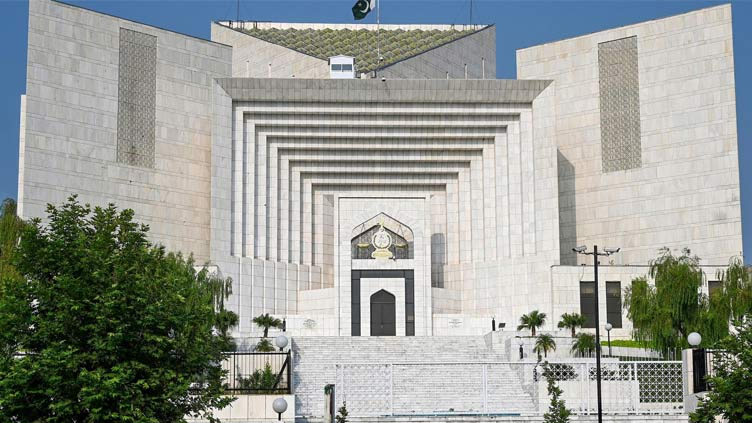Supreme Court questions jurisdiction of military courts over civilians

Pakistan
Raja stated that every eight to ten years, efforts were made to undermine judicial autonomy
ISLAMABAD (Dunya News) - During the hearing of an intra-court appeal against the trial of civilians in military courts, Justice Jamal Mandokhail questioned the extent of powers granted to military courts under the Army Act.
A seven-member constitutional bench, headed by Justice Aminuddin Khan, is hearing the appeal. The bench included justices Jamal Khan Mandokhail, Muhammad Ali Mazhar, Justice Hassan Azhar Rizvi, Musarat Hilali, Naeem Akhtar Afghan and Shahid Bilal Hassan.
Salman Akram Raja, representing a convict, Arzam Junaid, continued his arguments.
While making his case, Raja referred to the F.B. Ali case, that it was decided under the 1962 Constitution, prompting Justice Mandokhail to inquire, "What powers do military courts have under the Act? Can someone who is not part of the military be tried solely based on the nature of their crime?"
In response, Raja argued that even in the F.B. Ali case, the court emphasised that a civilian’s trial could only be justified if fundamental rights were fully ensured.
Justice Mazhar questioned, "F.B. Ali was himself a civilian. How was he subjected to a court-martial?"
Raja responded that the court had ruled that the provision of fundamental rights was essential and that in F.B. Ali’s trial, there was no violation of these rights.
Salman Akram Raja argued that Pakistan’s judicial system has faced repeated attempts to curtail its independence, particularly noting instances during 1977-1980 when the Balochistan High Court granted bail to individuals convicted under martial law.
He stated that every eight to ten years, efforts were made to undermine judicial autonomy.
Referring to past legal precedents, Raja highlighted that the Supreme Court has historically intervened to uphold fundamental rights, even striking down laws that restricted political freedoms, as seen in the case of the Pakistan People’s Party.
The bench also raised concerns regarding national security.
Justice Rizvi pointed out that hostile foreign agencies sometimes exploit civilians, raising complex legal questions about their prosecution under military laws.
He noted that sections 2(1)(d)(i) and 2(1)(d)(ii) of the Army Act, which previously allowed such trials, have been declared void. This, he suggested, could hinder the prosecution of individuals working against national interests.
In his arguments, Raja compared Pakistan’s Army Act with India’s, noting that the controversial provisions present in Pakistan’s law do not exist in the Indian legal framework.
Justice Mazhar challenged the relevance of this comparison, asking how such an assessment could be valid when the legal provisions in question are absent in India’s laws. Justice Khan further emphasised that Pakistan’s legal system operated independently of India’s.
Raja also made startling revelations about his personal legal troubles, disclosing that he faced an FIR accusing him of involvement in the alleged murder of three Rangers personnel on November 26. He claimed these accusations were part of a broader effort to silence him in court and in the media.
Expressing fears of his potential arrest on February 7, Raja warned that reinstating the controversial clauses of the Army Act would enable the government to target political opponents under the guise of national security.


